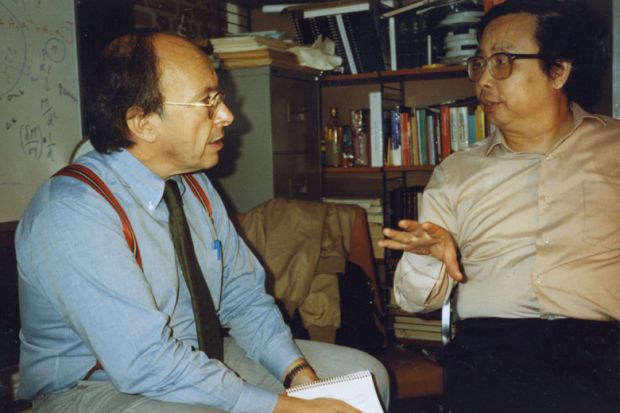A Chinese saying ridicules metaphorically clumsy or stupid people who “attempt to pick up rocks, but drop them on their own feet”. That is what the Chinese Communist Party managed throughout the career of the country’s most distinguished scientist, the physicist and dissident Fang Lizhi. If it weren’t such a catalogue of sadism and stupidity, it would be funny.
Just before the demonstrations erupted in Tiananmen Square in 1989, Fang, a world-class astrophysicist who was regularly welcomed at international scientific conferences, learned that no guests would be permitted at a meeting of scientists in south China. “The official reason offered for this policy,” he writes in this posthumously published memoir, “was that the universe and stars the scientists were studying were extremely sensitive state secrets that had to be protected at all costs.” But the real reason was that Fang was notorious for speaking about the need for freedom in order to carry out real science. By October of that year, Fang and his physicist wife Li Shuxian would be sheltering in soundproof rooms in the US Embassy to which they had escaped after the 4 June massacre in Tiananmen Square – aided by Perry Link, the US academic and champion of human rights in China, whose limpid translation of Fang’s memoir makes it such a pleasure to read despite the revealing and disturbing events it details.
Soldiers around the embassy ensured that Fang and Li could not escape. During a Halloween party, some of the Americans planned to wear Fang masks. “When the Chinese authorities heard this they panicked. They ordered the Ministry of Foreign Affairs to summon the U. S. ambassador and to deliver a stern warning that the Fang Lizhi couple not be smuggled out of the embassy in Halloween disguise. To this the ambassador did respond. He guaranteed that he would not choose Halloween as the day to see his guests off.”
To foreigners, the Chinese government’s idiocy was, and remains, incomprehensible. Fang recalls the amazement of his foreign hosts when, during a period of comparative political openness in China in the early 1980s, he began showing up at international conferences. At this point, he had already been expelled from the party twice, and earlier had been parted from his wife and two sons for more than 20 years and condemned to hard labour. At one such European event, Fang, chatting with physicist peers, mentioned in passing: “I had worked several times in the fields.” A foreign scientist, baffled, replied, “You mean field, right? Field theory.”
Wrong. Fang meant agricultural fields. “For us Chinese physicists,” he writes, “it was fairly common from the 1950s through the 1970s. I was sent from physics study to farms four different times.” He observes how more varied, in consequence, his career had been than that of any foreign scientist – outside the Soviet Union, where the physicist Andre Sakharov had been treated with similar harshness. A graduate of Peking University, Fang could list among his skills “well-digging, pig raising, railroad conduction, coal mining, and flat-bed cart pulling”. He helped to dig some of the tunnels under central Beijing, including those under Tiananmen Square, from which, to the amazement of those there, including me, soldiers suddenly appeared late on the night of 3 June 1989. At an academic conference in Italy, one of the scientists remarked how “slothful” Italians were compared with the diligent Chinese. Fang recalls: “Everyone laughed, including the Italians, who then added, ‘Chinese people are very diligent at keeping China undeveloped.’ The words stung...Even the ‘lazy’ Italians had achieved a developed society, so whatever was holding China back must be the result of very hard work by somebody.”
Yet Fang stayed in China, despite opportunities to become an academic star in a Western democracy. Outside China, he remarks, “life is steadier and more peaceful, but it is somehow less engaging. I found that political trouble could be oddly addictive.” In many years of talking with Chinese dissidents and reading their accounts, I find this view unique.
By 1980, Fang was laying it addictively, fearlessly and publicly on the line: “The three fundamental elements in Marxism – philosophy, political economy, and scientific socialism – are all out of date,” he told an academic conference. “Humankind has passed through a number of stages of civilization, and Marxism can be viewed as one of them...humanity passes into a new future only by shedding old ways of thinking.”
Later, in what he calls his “standard template”, he told students at the University of Science and Technology of China, where he was vice-president, “Where did the Party come from? And in what sense does it ‘give’ you something? We were all born with the rights to think and be educated. We are all owners of this right; it is not something the Party gives us. To say that the Party bestows these things is a reflection of a feudal mind-set.” Enraged by Fang’s disloyalty, the party expelled him yet again and – once more I stand amazed – printed 500,000 copies of a 200-page collection of excerpts from his speeches, intended to fuel denunciations. Of course, Fang observes, instead “it spread my ideas more effectively”; readers liked what they read, and the book was withdrawn. In one day alone, Fang received 157 letters, all of them expressing approval.
Forging fearlessly on, in January 1989, five months before the Tiananmen demonstrations began, Fang wrote to Mao Zedong’s successor, Deng Xiaoping: “I sincerely propose that you announce a general amnesty, specifically to include all political prisoners such as Wei Jingsheng…who has already served 10 years in prison.” Wei, an electrician, had appeared at Beijing’s Democracy Wall, as it had come to be known 10 years before, and called for democracy. (He was swiftly jailed, and now lives in the US.) Deng did not answer Fang’s letter, but Link obtained it from Fang, translated it, and the letter received widespread attention.
In late February 1989, when Fang and Li accepted an invitation from US president George H. W. Bush to a Texas-style barbecue at a Beijing hotel, they started out with Link and his wife in a cab. Although Fang had duly informed the authorities of the invitation, no prohibition was issued – until the group attempted to reach the hotel. Their taxi was stopped, and despite trying buses, further taxis and proceeding on foot, they never reached the barbecue. As Fang mused: “It showed that the highest priority of the highest-ranking [Chinese] agent in charge of security for the US president was not the security of the US president.”
Now events escalated. The Tiananmen demonstrations convulsed not only Beijing but also more than 200 other Chinese cities, and although Fang stayed away, knowing that his presence could cause worse trouble for the students and workers, he was warned of arrest and the possibility of “accidents”. Soon he was labelled “the biggest black hand behind the June Fourth riots”. In the wake of the demonstration’s deadly outcome, he, Li, their son Fang Zhe and Link headed for the US Embassy. After some negotiations, the three were admitted and sheltered for 13 months, during which Fang wrote several papers and most of this memoir. After long negotiations between the Americans and the Chinese, Fang issued a tepid statement and he and Li were allowed to leave the country. After six months in the UK as guests of Martin Rees, who was then Astronomer Royal and who offers praise for Fang on this book’s cover, they settled for 22 years at the University of Arizona. During that time, Fang would write more than 160 papers; none was published in China, where even his name was taboo.
When Fang died in 2012, there was an outburst of praise for him via the internet by his Chinese admirers – until the state suppressed online access to all mentions of him. One surviving poem includes these words: “Fang and the Communist Party are more like Galileo and the Roman Church…The authority persecutes the physicist, but the physicist gets the truth right.”
Jonathan Mirsky was formerly associate professor of Chinese, history and comparative literature at Dartmouth College in the US, and former Far East editor of The Times.
The Most Wanted Man in China: My Journey from Scientist to Enemy of the State
By Fang Lizhi
Translated by Perry Link
Henry Holt, 352pp, £21.99
ISBN 9781627794992
Published 14 March 2016
Thinking the unthinkable
An excerpt from Fang Lizhi’s memoir The Most Wanted Man In China: My Journey from Scientist to Enemy of the State on the Saturday-night discussions he had at Peking University in the spring of 1957, ranging over physics, philosophy and politics, with his future wife Li Shuxian.
I have forgotten most of what we talked about, but one item sticks in my memory. We were discussing an article by Werner Heisenberg about controversies in quantum mechanics. Heisenberg wrote, at one point, that Dmitrii Blokhintsev’s “new explanation” of quantum mechanics was nothing more than an attempt to accommodate Lenin’s political needs—or words to that effect. Seeing such a disrespectful reference to Lenin shocked us. In China at the time (and now, too), Lenin was a prophet comparable only to Marx. He was one of those four great foreigners—Marx, Engels, Lenin, and Stalin—whose hallowed likenesses were constantly offered to the Chinese public for their adulation. It was unthinkable that Heisenberg’s quip could ever appear in a Chinese publication.
Despite the shock, the logic of physics impelled us to push ahead and consider Heisenberg’s point. The same Dmitrii Blokhintsev was the author of one of our college textbooks, A Course in Quantum Mechanics. The book was published in the 1940s, at the height of the Soviet Union’s criticism of “bourgeois science,” and its author states up front that his reason for offering a “new explanation” is to criticize and replace “bourgeois quantum mechanics.” His new explanation was not bogus science in the way that Trofim Lysenko’s far-fetched “agronomy” was. But there was no question that it was an incursion of ideology into an area where it did not belong. It was politics, not physics.
Heisenberg’s criticisms of Lenin did not completely undo the place of Lenin in my mind, but they did force me to realize that in the eyes of science, even a saint like Lenin did not have privileged status. His words, like anyone’s, were subject to science’s rules of logic and evidence. If forced to choose between science and non-science, I would have to choose science, no matter how brightly the halos shone on the non-science side. You can’t cheat physics.
POSTSCRIPT:
Print headline: The authority v the physicist
Register to continue
Why register?
- Registration is free and only takes a moment
- Once registered, you can read 3 articles a month
- Sign up for our newsletter
Subscribe
Or subscribe for unlimited access to:
- Unlimited access to news, views, insights & reviews
- Digital editions
- Digital access to THE’s university and college rankings analysis
Already registered or a current subscriber?




